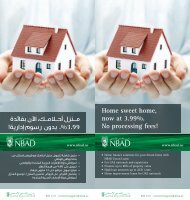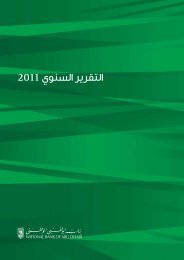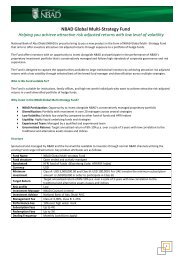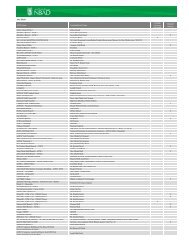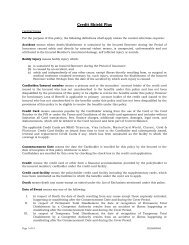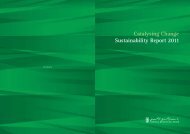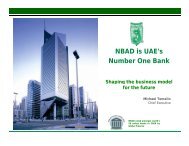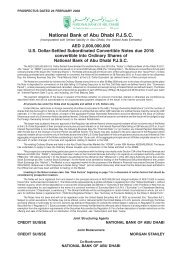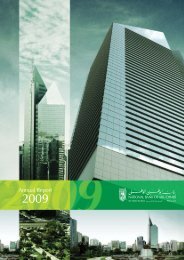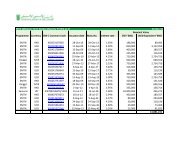- Page 2 and 3:
Creating relationships that create
- Page 4 and 5:
Broad horizon, local expertise, att
- Page 6 and 7:
Dubai International Financial Centr
- Page 9 and 10:
Editor / Author Gıyas Gökkent’s
- Page 11 and 12:
Table of Contents Page 3 Acknowledg
- Page 13 and 14:
Country Chapters 8. Bahrain 217 Eco
- Page 15 and 16:
Index - Charts & Tables Chapter 1 -
- Page 17 and 18:
171 Performance of Shariah Complian
- Page 19 and 20:
Chapter 9 - Egypt 242 Assets and Nu
- Page 21 and 22:
Chapter 15 - United Arab Emirates 3
- Page 25 and 26: Global Trends Economic Developments
- Page 27 and 28: Global Trends Worldwide funds exper
- Page 29 and 30: Global Trends Breakdown of Global F
- Page 31 and 32: Global Trends Fiduciary Assets of S
- Page 33 and 34: Global Trends Focus: 2013 Outlook I
- Page 35 and 36: Global Trends ING IM says that the
- Page 37 and 38: Global Trends Mutual Fund Assets by
- Page 39 and 40: Global Trends Selected Data by Coun
- Page 41 and 42: Global Trends notably with the UAE,
- Page 43 and 44: Global Trends investment managers o
- Page 45: MENA Region Trends
- Page 48 and 49: Middle East & North Africa In 2013,
- Page 50 and 51: Middle East & North Africa Fund Ass
- Page 52 and 53: Middle East & North Africa Number o
- Page 54 and 55: Middle East & North Africa Average
- Page 56 and 57: Middle East & North Africa d) In Du
- Page 58 and 59: Middle East & North Africa Q/ Which
- Page 60 and 61: Middle East & North Africa Trends b
- Page 62 and 63: Middle East & North Africa Equity F
- Page 64 and 65: Middle East & North Africa Fixed In
- Page 66 and 67: Middle East & North Africa curve an
- Page 68 and 69: Middle East & North Africa Focus: F
- Page 70 and 71: Middle East & North Africa 1) DFSA
- Page 73: GCC Region Trends
- Page 77 and 78: Gulf Cooperation Council Region inc
- Page 79 and 80: Gulf Cooperation Council Region Ave
- Page 81 and 82: Gulf Cooperation Council Region Ass
- Page 83 and 84: Gulf Cooperation Council Region Loc
- Page 85 and 86: Gulf Cooperation Council Region hig
- Page 87 and 88: Gulf Cooperation Council Region Tre
- Page 89 and 90: Gulf Cooperation Council Region In
- Page 91 and 92: Gulf Cooperation Council Region In
- Page 93 and 94: Gulf Cooperation Council Region Ind
- Page 95 and 96: Gulf Cooperation Council Region A/
- Page 99 and 100: Regulatory Trends Recent Regulatory
- Page 101 and 102: Regulatory Trends had been under co
- Page 103 and 104: Regulatory Trends In article 35, cl
- Page 105 and 106: Regulatory Trends Regulatory Perspe
- Page 107 and 108: Regulatory Trends Q/ Foreign entiti
- Page 109 and 110: Regulatory Trends Q/ What areas are
- Page 111 and 112: Regulatory Trends Moreover, the reg
- Page 113 and 114: Regulatory Trends and greatly reduc
- Page 115 and 116: Regulatory Trends The Dubai Financi
- Page 117 and 118: Regulatory Trends How Funds are reg
- Page 119 and 120: Regulatory Trends o o Investment Co
- Page 121 and 122: Regulatory Trends Hedge Funds The
- Page 123 and 124: Regulatory Trends the level of pro
- Page 125 and 126:
Dubai International Financial Centr
- Page 127 and 128:
Dubai International Financial Centr
- Page 129 and 130:
Dubai International Financial Centr
- Page 131 and 132:
Dubai International Financial Centr
- Page 133 and 134:
Bahrain / Kuwait Exchange Traded Fu
- Page 135 and 136:
Bahrain / Kuwait Exchange Traded Fu
- Page 137 and 138:
Bahrain / Kuwait Exchange Traded Fu
- Page 139 and 140:
Bahrain / Kuwait Exchange Traded Fu
- Page 141 and 142:
Bahrain / Kuwait Exchange Traded Fu
- Page 143 and 144:
Bahrain / Kuwait Exchange Traded Fu
- Page 145 and 146:
United Arab Emirates / Egypt Exchan
- Page 147 and 148:
United Arab Emirates / Egypt Exchan
- Page 149 and 150:
United Arab Emirates / Egypt Exchan
- Page 151 and 152:
United Arab Emirates / Egypt Exchan
- Page 153 and 154:
Oman / Saudi Arabia Exchange Traded
- Page 155 and 156:
Oman / Saudi Arabia Exchange Traded
- Page 157 and 158:
Oman / Saudi Arabia Exchange Traded
- Page 159 and 160:
Oman / Saudi Arabia Exchange Traded
- Page 161:
Benchmarks
- Page 164 and 165:
Benchmarks dataset. The dataset inc
- Page 166 and 167:
Benchmarks Selected Benchmarks Used
- Page 168 and 169:
Benchmarks index which includes com
- Page 170 and 171:
Benchmarks Qatar and United Arab Em
- Page 172 and 173:
Benchmarks Performance Rankings A n
- Page 174 and 175:
Benchmarks Performance of Conventio
- Page 176 and 177:
Benchmarks Performance of Selected
- Page 178 and 179:
Benchmarks Money Market Funds Perfo
- Page 180 and 181:
Benchmarks Performance of Conventio
- Page 182 and 183:
Benchmarks Performance of Selected
- Page 184 and 185:
Benchmarks Q/ What have been the ma
- Page 186 and 187:
Benchmarks have included Turkey for
- Page 191 and 192:
Sharia Compliant Funds Global Backg
- Page 193 and 194:
Sharia Compliant Funds Number of Sh
- Page 195 and 196:
Sharia Compliant Funds Focus: Islam
- Page 197 and 198:
Sharia Compliant Funds The predomin
- Page 199 and 200:
Sharia Compliant Funds million), wh
- Page 201 and 202:
Sharia Compliant Funds From our poi
- Page 203 and 204:
Sharia Compliant Funds In 2012H1, a
- Page 205 and 206:
Sharia Compliant Funds Types of Sha
- Page 207 and 208:
Sharia Compliant Funds Breakdown of
- Page 209 and 210:
Sharia Compliant Funds Top 10 MENA
- Page 213 and 214:
Exchange Traded Funds Global Backgr
- Page 215 and 216:
Exchange Traded Funds according to
- Page 219 and 220:
Bahrain Economic Developments Chall
- Page 221 and 222:
Bahrain There were 2,689 foreign fu
- Page 223 and 224:
Bahrain The number of foreign funds
- Page 225 and 226:
Bahrain Growth Rate of Fund Assets
- Page 227 and 228:
Bahrain Breakdown of Locally Incorp
- Page 229 and 230:
Bahrain Trends by Fund Type Overvie
- Page 231 and 232:
Bahrain Fixed Income Funds In 2012H
- Page 233 and 234:
Bahrain as well as most of our peer
- Page 235 and 236:
Bahrain In addition, we believe tha
- Page 237 and 238:
Bahrain - Directory Oman 11 BNP Par
- Page 239 and 240:
Bahrain - Directory Oman 32 Ithmaar
- Page 243 and 244:
Egypt Economic Background Uncertain
- Page 245 and 246:
Egypt Top Fund Management Companies
- Page 247 and 248:
Egypt Trends by Fund Type (based on
- Page 249 and 250:
Egypt Money Market Funds In 2012H1,
- Page 251 and 252:
Egypt - Directory Oman 11 Commercia
- Page 253:
Kuwait
- Page 256 and 257:
Kuwait Based on information provide
- Page 258 and 259:
Kuwait Fund Assets by Operator and
- Page 260 and 261:
Kuwait Trends by Fund Type (based o
- Page 262 and 263:
Kuwait Fixed Income Funds In 2012H1
- Page 264 and 265:
Kuwait - Directory Al Muthana Inves
- Page 266 and 267:
Kuwait - Directory Oman Burgan Bank
- Page 268 and 269:
Kuwait - Directory Kuwait and Middl
- Page 270 and 271:
Kuwait - Directory Tamdeen Real Est
- Page 273 and 274:
Morocco Economic Background Slowdow
- Page 277 and 278:
Oman Economic Background Higher oil
- Page 279 and 280:
Oman Sponsor Company Vision Investm
- Page 283 and 284:
Qatar Economic Developments Hydroca
- Page 285 and 286:
Qatar Fund Industry Breakdown by Se
- Page 287 and 288:
Qatar Banks - Investments under Man
- Page 289 and 290:
Qatar Banks - Growth of Fund Assets
- Page 291 and 292:
Qatar Purpose Vehicle for a Sukuk i
- Page 293 and 294:
Qatar Selected Regulated Firms at Q
- Page 295 and 296:
Qatar Count QFC # Firm Name License
- Page 297 and 298:
Qatar Directory of Banks in the Sta
- Page 299 and 300:
Qatar - Directory Oman Company Phon
- Page 303 and 304:
Saudi Arabia Economic Background Hi
- Page 305 and 306:
Saudi Arabia Fund Industry Profile
- Page 307 and 308:
Saudi Arabia Annual Change in Numbe
- Page 309 and 310:
Saudi Arabia Top Fund Management Co
- Page 311 and 312:
Saudi Arabia According to the Capit
- Page 313 and 314:
Saudi Arabia Number of New Funds by
- Page 315 and 316:
Saudi Arabia Annual Growth Rates of
- Page 317 and 318:
Saudi Arabia In terms of investment
- Page 319 and 320:
Saudi Arabia Trends by Fund Type (b
- Page 321 and 322:
Saudi Arabia Equity Fund Assets by
- Page 323 and 324:
Saudi Arabia Money Market Funds In
- Page 325 and 326:
Saudi Arabia - Directory Oman ANB I
- Page 327:
Saudi Arabia - Directory Oman Riyad
- Page 332 and 333:
United Arab Emirates Industry Overv
- Page 334 and 335:
United Arab Emirates Fund Industry
- Page 336 and 337:
United Arab Emirates Breakdown by O
- Page 338 and 339:
United Arab Emirates Dubai Internat
- Page 340 and 341:
United Arab Emirates Focus: Industr
- Page 342 and 343:
United Arab Emirates MEMBERS: Natio
- Page 344 and 345:
United Arab Emirates - Directory Om
- Page 346 and 347:
United Arab Emirates - Directory Om
- Page 348 and 349:
346



